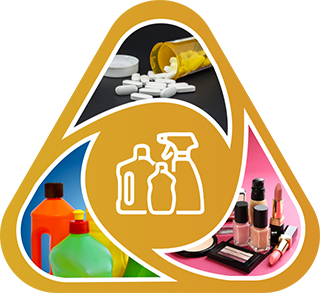
Much of the work carried out by DTT is in support of the National Toxicology Program (NTP), an interagency partnership of the Food and Drug Administration, National Institute for Occupational Safety and Health, and NIEHS.
Table of Contents

Public Health Significance
The large number of consumer product chemicals that people are exposed to presents challenges for determining potential adverse human health outcomes. Some issues include the following:
- Consumer products often contain complex mixtures and frequently result in low-level, chronic daily exposures.
- The pace of traditional, chemical-by-chemical toxicity testing methods is insufficient to inform timely public health decision making.
When it comes to therapeutics, unforeseen health effects may require additional toxicity testing to address potential concerns. For example, problems may arise for individuals exposed to human immunodeficiency virus therapies across the lifespan or during different life stages.
Research Objectives
Consumer Products and Therapeutics (CPT) research in the NIEHS Division of Translational Toxicology (DTT) is structured around the following objectives:
- Apply class-based methodologies as a framework for assessing potential human health effects of chemicals in consumer products and consistently evaluate their effectiveness using existing toxicity data. This will guide and prioritize testing and further research strategies. The starting point will be a class-based assessment of organo-halogenated flame retardants, or OFRs (more on that below).
- Partner early with appropriate stakeholders (e.g., the National Institutes of Health Office of AIDS Research) to provide impactful scientific knowledge on therapeutics.
- Strengthen and build partnerships across federal agencies and nongovernmental organizations to contribute value-added research for both consumer products and therapeutics, to facilitate a broader dissemination of information and guide public health decisions.
Background
CPT research provides a unique opportunity to inform regulatory decision making by strategically directing our efforts toward class-based approaches. Evaluating potential toxicities that can prevent human disease from exposure to the vast number of chemicals present in consumer products is a critical public health goal.
- For consumer products, CPT research is using a chemical class assessment of OFRs as the exemplar, due to widespread human exposure to the substances and support from the U.S. Consumer Product Safety Commission. DTT has a strong history of research on flame retardants that will support and inform the research.
- DTT is leveraging a multidisciplinary approach that has the potential to support, influence, and produce cutting-edge data that could impact public health decisions. Data mining and literature scoping will lead to the development of evidence maps that can serve as a foundation for evidence-based decisions for analysis and downstream predictive toxicity testing by high-throughput computational methods and experimental assays.
For therapeutics, CPT research has engaged key partners for discussions regarding compound evaluations or questions of mutual interest (e.g., discussions with the U.S. Food and Drug Administration on genotoxic impurities in drugs). Presently, the primary focus for therapeutics research within DTT is the evaluation of HIV combination antiretroviral therapies across the lifespan or during different life stages to better understand potential treatment-associated comorbidities, coinfections, and complications.
Select Studies
| Study | Description | Findings/Supporting Files |
|---|---|---|
| Organohalogen Flame Retardants (OFRs): Literature-based Evaluation | Scoping review and evidence mapping on exposure to OFRs present in consumer products to support decisions on class-based approach for assessing OFR hazards. | Ongoing |
| Systematic review and carcinogenicity hazard assessment of OFRs for the Report on Carcinogens. | Ongoing | |
| Chemicals in Personal Care Products: Literature-based Evaluation | Scoping reviews on exposure to the consumer product use category, personal care products, to establish evidence base for research and analysis decisions on potential association with timing of puberty or fetal growth. | Ongoing |
| HIV Therapeutics: Evaluations of Combined Antiretroviral Combination Therapies | Subchronic study of Emtricitabine (FTC), Tenofovir (TDF), and Efavirenz (EFV). | In-life complete, analysis ongoing |
| Evaluation of cardiovascular toxicity of Abacavir (ABC), Dolutegravir (DTG), and Lamivudine (3TC). | Ongoing | |
| Lifestage evaluation of neurotoxicity of Abacavir (ABC), Dolutegravir (DTG), and Lamivudine (3TC). | Ongoing |


